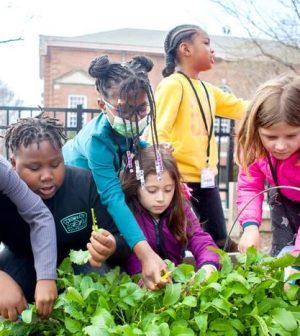- Could Your Grocery Store Meat Be Causing Recurring UTIs?
- Are You Making This Expensive Thermostat Error This Winter?
- Recognizing the Signs of Hypothyroidism
- 10 Strategies to Overcome Insomnia
- Could Artificial Sweeteners Be Aging the Brain Faster?
- Techniques for Soothing Your Nervous System
- Does the Water in Your House Smell Funny? Here’s Why
- Can a Daily Dose of Apple Cider Vinegar Actually Aid Weight Loss?
- 6 Health Beverages That Can Actually Spike Your Blood Sugar
- Treatment Options for Social Anxiety Disorder
Getting School Kids Gardening Pays Off for Eating Habits

Tending a garden can help young kids develop healthy attitudes about food that will influence their health years later, a new study says.
Kids who participated in a gardening and food education program during elementary school were more likely to eat healthier as they grew up, researchers found.
“Kids who grow vegetables in a school garden and learn how to prepare meals seem to show a lasting desire for fresh, healthy food as young adults,” lead author Christine St. Pierre, a doctoral candidate and researcher at the George Washington University Milken Institute School of Public Health, said in a news release.
For the study, researchers brought together focus groups made up of current and past participants in the FoodPrints food education program, which is offered in 20 elementary schools in Washington, D.C.
On average, older participants in the focus groups were ninth-graders.
The program starts when students are 3 years old, in pre-kindergarten, and continues through fifth grade.
In the program, kids help grow vegetables and fruits in a school garden, harvest their produce, and then use it to prepare healthy food.
Current and former participants said the program helped them better appreciate fresh food offerings at home.
“Almost all of the foods that we eat in FoodPrints, I didn’t really eat at home before then,” one participant said. “Like I didn’t eat ABC [apple, beet, carrot] salad before FoodPrints. I didn’t eat sweet potato biscuits before FoodPrints.”
The program also taught them how to prepare dishes and gave them confidence in the kitchen, results show.
“We all got like recipe books and like recipe cards that we could take home… like once we did it in class, it’s like I definitely made a lot of the recipes at home,” one participant said. “And so I think it definitely impacted the types of things that I was making with my family.”
Further, parents appeared to pick up the lessons learned by the kids.
“I think it’s had an effect on like, especially my parents,” one participant said. “Like, they think, ‘Oh, this is a healthier option that my kids would totally eat because they like it, and they’ve made it before.’ So I think with the parents, it was like, ‘Hey, we should start eating these kinds of foods more.’ And that’s part of how it affected like, some of our meals.”
Older kids who’d gone through the program said they were more open to trying new foods and had more confidence in their ability to make healthy choices.
“I think that that same excitement and joy that came from FoodPrints kind of has carried over into the way that I’m able to enjoy cooking now…prepping a meal, chopping up vegetables, those basic things, learning those skills at early age and making it fun and interesting,” a participant said.
The researchers argued that such programs can help improve kids’ health throughout their life, by improving the ongoing quality of their diets.
“The hope is that such programs could help teens and young adults make better food choices as they grow older,” St. Pierre said.
The findings were published in the January issue of the Journal of Nutrition Education and Behavior.
More information
FRESHFARM Markets has more about the FoodPrints program.
SOURCE: George Washington University, news release, Jan. 8, 2024
Source: HealthDay
Copyright © 2026 HealthDay. All rights reserved.










